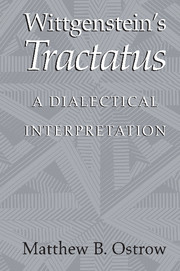IV - The liberating word
Published online by Cambridge University Press: 03 February 2010
Summary
Having completed our study of the details of the Tractatus, we can now reconsider from a more general perspective its fundamental aim or aims. There is, to be sure, a certain oddness in speaking here of a “conclusion,” given what has been maintained thus far about the nature of this text; one wonders about the status of any summary remarks that we might have to offer. After all, if, as we have held throughout, a genuine understanding of the views of Wittgenstein can only be conveyed through a detailed appreciation of the movement of his thought, should we not suppose that everything of importance has already been said? Still, the question of how the author understands the ultimate outcome of his endeavor remains to be directly addressed. How can it be that the Tractatus' real purpose is an ethical one, as Wittgenstein suggests?
Before approaching the question, we would do well to review where we have been. We recall, then, that this text can be understood as, from the beginning, seeking to adopt a “logical” perspective on the world, the perspective from which the possibility of the facts is revealed. This involves the attempt to specify the real nature – the form – of the objects conditioning what is the case. We saw that this form, as given by the full range of the object's occurrences in a space of atomic facts, cannot be conceived as a self-standing entity, let alone as a further fact about the world. Instead, it is just a particular way of looking at what is the case: the revealing of the form of the object turns out to involve nothing more than a description of the world that will make perspicuous the combinatorial capacities of that description's fundamental components.
- Type
- Chapter
- Information
- Wittgenstein's TractatusA Dialectical Interpretation, pp. 125 - 136Publisher: Cambridge University PressPrint publication year: 2001



